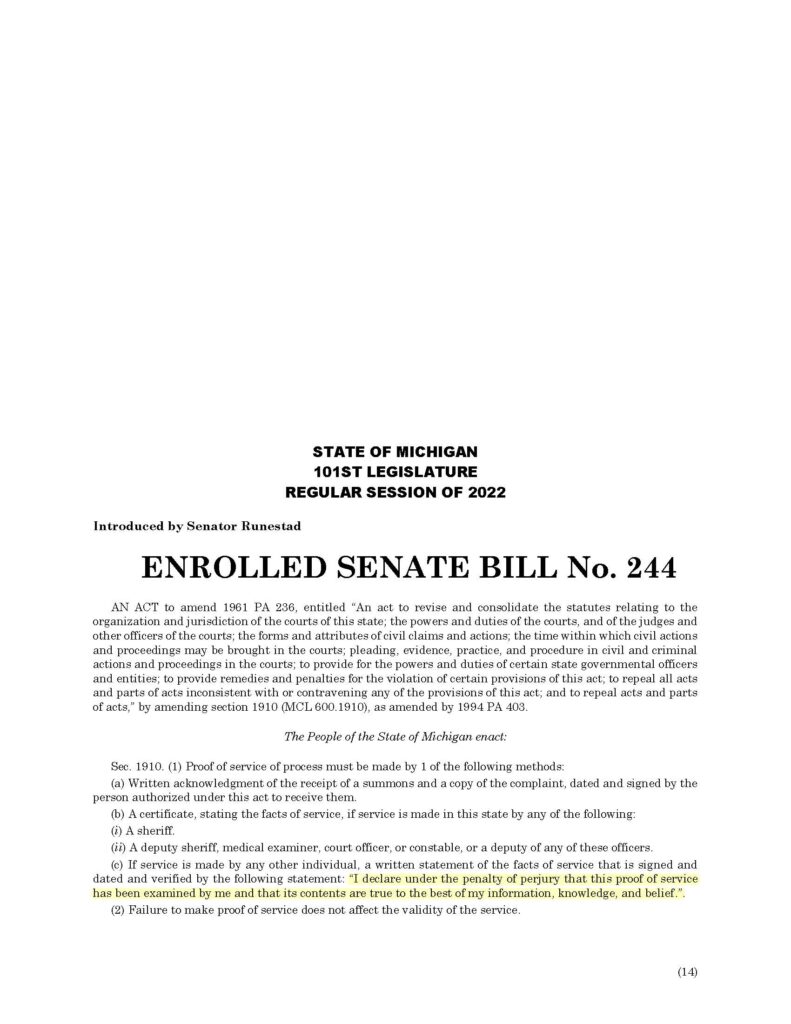Michigan’s P.A. 2022, No. 36 will be a great law. The Governor signed it yesterday and it will go into effect in 180 days.
What it will do: The proof of service for the summons and complaints of civil lawsuits will no longer have to be notarized when served by an adult (who is not a sheriff, deputy sheriff, bailiff, appointed court officer, or party attorney).
How it does that: Current law (MCL 600.1910(1)(c)) requires an “affidavit.”
As a matter of function, affidavits must be notarized. The second page of Michigan’s current court form (MC 01) includes an “Affidavit of Process Server” section and reminds us that notarization is required. Plus, immediately above where a person signs the proof of service, Michigan’s current court form requires the person to assure that:
I declare under the penalties of perjury that this proof of service has been examined by me and that its contents are true to the best of my information, knowledge, and belief.
MC 01 (9/19) Summons
Fun fact detour: The current court form’s declaration already triggers MCL 750.423(2)’s perjury penalties.


The new law, P.A. 2022, No. 36, eliminates the affidavit requirement. In other words, those serving papers will no longer need to have their signatures notarized. The new law adds the language already listed on the Michigan court form: “I declare under the penalty of perjury that this proof of service has been examined by me and that its contents are true to the best of my information, knowledge, and belief.”
The wording from the existing court form and the new law is identical.


Shifting from required notarization to a simple signed declaration made under the penalty of perjury is the right thing to do.
This positive form of “process simplification” follows national trends of waiving notarization requirements and is encouraged by national state court leaders.
Appreciating the collective context, it was no surprise to me that the September 9, 2021, October 4, 2021, December 8, 2021, and January 11, 2022 legislative analyses were “vanilla.” And it passed the senate with no “nay” votes on December 8, 2021.
I was caught by surprise, however, by the January 12, 2022 testimony before the house judiciary committee, the filed documentation, and the February 20, 2022 legislative analysis. The offered narrative was that the current state court process is weak/soft and the legislation would be a way to crack down on those who file a false proof of service.
From the February 20, 2022 legislative analysis:
According to the sponsor of the bill, fraudulent service of process is an issue in Michigan that may hinder a person’s right to due process. Some in the profession of serving process believe that fraudulent acts may be deterred, and that process servers may do their jobs more diligently, if the proof of service includes a reminder that falsely acknowledging service is a felony offense.
How will the new law do that? As I already shared: by codifying the language already listed on the Michigan court form: “I declare under the penalty of perjury that this proof of service has been examined by me and that its contents are true to the best of my information, knowledge, and belief.”
Because the wording is identical to what is already on the Michigan court form, I have no idea why the legislative discourse took that unnecessary turn.
The final analysis: The net positive from this legislative experience is what was signed into law. In 180 days from March 23, 2022, the proof of service for the summons and complaints of civil lawsuits will no longer have to be notarized when served by an adult (who is not a sheriff, deputy sheriff, bailiff, appointed court officer, or party attorney).
In terms of process simplification and making things less burdensome for parties, that is a great thing!
In terms of the ability to hold accountable those who choose to file a false proof of service, the court form’s language and the possible legal consequences remain the same.
